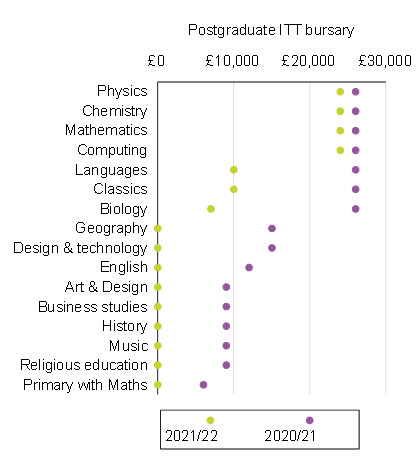The government has slashed some teacher training bursaries by as much as 73 per cent, with others scrapped altogether, as the supply of people wanting to be teachers rises because of the coronavirus.
New guidance on initial teacher training funding for the 2021-22 academic year shows all bursaries previously offered by the government to trainees in shortage subjects have either been reduced or scrapped. Education economist Jack Worth described the changes as “really quite radical cuts”.
The government said the financial incentives announced today for 2021-22 add up to £130 million, which is almost half of the £250 million pledged by the government last year.

It comes after research showed that the Covid-19 pandemic and ensuing recession could eradicate shortfalls in almost all subjects. The government has also reported a 30 per cent increase in teacher training applications between February and August compared to the same time last year.
This year, bursaries of £26,000 were offered for chemistry, computing, languages, maths, physics, biology and classics trainees with degrees in their subjects.
But for 2021-22, the bursary for chemistry, computing, maths and physics has been reduced to £24,000, while for languages and classics it has been slashed to £10,000 and in biology to £7,000.
Emma Hollis, chief executive of the National Association of School-Based Teacher Trainers, said she was “disappointed that a short-term view has been taken on financial incentives designed to attract the best quality candidates into our classrooms”.
“The immediate increase that we have seen in teacher recruitment does not solve the longer term recruitment crisis, it only disguises it, and failing to take a long term view will only store up issues for the future.”
The DfE has also confirmed it has scrapped its relatively new system of early-career payments in chemistry, languages, maths and physics. The additional payments of between £2,000 and £3,000 were made on top of bursaries to new teachers in their second, third and fourth years of teaching. They were introduced to try to aid teacher retention.
Bursaries offered this year in geography, design and technology, English, art and design, business studies, history, music, religious education and primary maths have been scrapped altogether for 2021-22.
The scholarship offered to trainees in chemistry, computing, maths and physics has also been reduced – from £28,000 to £26,000 – while the scholarship in languages and geography will no longer be available.
A report from the National Foundation for Educational Research last month predicted that increased recruitment during the pandemic, coupled with higher retention rates, could close gaps in shortage subjects such as maths, modern foreign languages and chemistry, which have all seen a “substantial increase” in offers.
When the boost to retention rates is taken into account, the organisation estimated that recruitment in some subjects could be as much as 240 per cent of what is needed.
The government has been criticised for allowing “bursary tourism”, with the National Audit Office finding £1 billion had been spent on bursaries without any proper evaluation of whether they were working.
The move to make bursaries less attractive also comes as the DfE prepares to raise the starting salary for new teachers to at least £30,000.
Some initiatives have survived the cull, however. The undergraduate bursary of £9,000 for those studying a qualified teacher status course in secondary maths or physics, or those studying an opt-in QTS course in secondary undergraduate computing, languages, mathematics or physics, will remain in place in 2021-22.
The troops to teachers undergraduate bursary, worth £40,000 to those who have left employment in the British Army, Royal Air Force or Royal Navy and enrol on certain eligible QTS courses within five years, will also continue.
The DfE has also changed the way its grants for schools to help cover the salaries and training costs of trainees on school-direct salaried routes will work.
The grants were previously available for trainees in chemistry, classics, computing, maths, languages, physics, biology, design and technology, English, geography, history, music, RE and primary teachers, and ranged from £9,000 to £23,900 depending on the subject and location of the school.
The new grants will be £24,000 for chemistry, computing, maths and physics, £10,000 for languages and classics and £7,000 for biology, and will be at the same level regardless of where a school is. Other subjects will no longer be covered.
Grants to help schools pay postgraduate teaching apprentices have also been simplified. From 2021-22, the DfE will pay schools £15,000 for apprentice teachers of chemistry, computing, maths and physics, and £1,000 for those in classics and languages. Grants in other subjects will be scrapped.
But schools minister Nick Gibb said: “Teaching remains an attractive proposition, which is evidenced by the significant increase in applications over the last few months, and these financial incentives are set to attract those to the hardest to recruit subjects.”








I was planning to apply for teacher training next year, but now probably won’t. As a career changer, I was willing to consider a nearly 50% salary drop once I started teaching, but I was relying on the bursary for the teaching year out of work to be affordable. I don’t fancy another £20K of student loans on top of a massive salary sacrifice.
We have many staff at our school that have worked in the “real world” and they’d say without exception that teaching is the hardest job they have done. In this country, in the current politicised environment, it is utterly toxic for most teaching staff. The teachers love teaching but the cost to personal life is way too high. Go abroad where you’re appreciated.
I completely agree, this is my exact situation too. It’s shocking that our govt doesn’t value teaching enough to make training to do it a financially viable, let alone attractive, option for people who could be great teachers. So sad.
Similar situation – I’m looking at a career change (though I used to work as an unqualified teacher) and I’ll already be looking at a salary sacrifice. The bursary/scholarship was going to be essential for me to pay for my expenses. I just cannot afford to do it otherwise – the loan isn’t enough (and similarly, I don’t want to take on a tonne of extra debt either). Kicking myself as I initially pursued teacher training in 2019 and for various reasons it just wasn’t practical then.
The problem is you know a lot of these students going for teacher training this year will have done so because of redundancy/furlough and will likely quit the profession once things pick up again.
My daughter wanted to get through university with very little debt so was originally considering a degree apprenticeship. However, she really wanted to be a geography teacher and the bursary would have made that possible. Not anymore. Back to degree apprenticeship.
Same here. I think a lot of the applicants will drop out now the bursary information has been released.
I am the same – I needed the bursary to be able to do a Secondary English PGCE but now I can’t because I have children and it’s just not feasible. 🙁
I was planning to undertake a PGCE next year to teach Secondary English. Now I will be unable to. As I’m 23, my student finance will go off what my parents earn despite me not living with them. Going back to my family home is not an option for me. After studying for a Master’s degree I was hoping for a bit of financial help but that all has been ripped away.
Strange how supply and demand dictate reducing the teaching bursaries within months but when hospitals were ringing the alarm bells because they couldn’t encourage people into nursing it took years of shortfalls to persuade them to do anything. But of course it does mean you can save money by importing readily trained staff from abroad. Certainly keeps taxes down.
I was approved for a Student Loan for my University Fees 2020 PGCE. The bursary of £24,000 was awarded for my 2020 course which commeced in September 2020 but due to unforseen circumstances in November 2020 I had to defer myself 2021. Now since the DFE says the bursary will be dropped to £7,000 in 2021 I don’t see why if I am not a new applicant and was already approved for the £24,000 bursary that the DFE should slash my bursary to £7,000 since I am not a new applicant for 2021 intake but was already approved for my bursary in 2020. I hope the DFE does not welch on its commitment to me merely because I deferred my course which already has shaken my financial standing more than ever before I began the course.